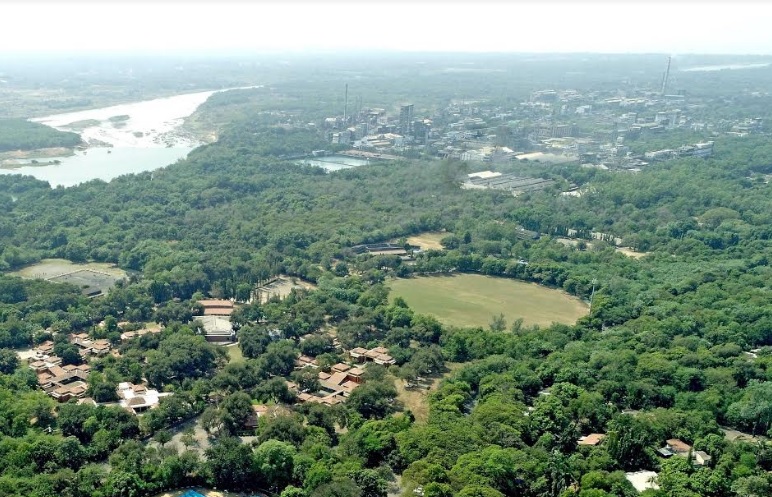Incorporated in 1947 by Kasturbhai Lalbhai, a businessman and philanthropist, Atul Ltd. (formerly The Atul Products Ltd.) is the first private sector company of India whose manufacturing facilities were inaugurated by the first Prime Minister of India, Pandit Jawaharlal Nehru. Atul village of Gujarat state, which houses the first site of the Company, was named after the Company. The site measures 1,200 acres and has grown one million trees.
 |
Atul Ltd. – One of the greenest chemical complexes in the world
Atul began with manufacture of just a few textile dyes. The Company now operates sites in Ankleshwar and Panoli in Gujarat, Ambernath and Tarapur in Maharashtra, Jodhpur in Rajasthan and Glastonbury in the UK. The Company has also established subsidiary companies in Brazil, China, Ireland, the UAE, the UK and the USA. From a single product, it now manufactures about 900 products and 400 formulations serving 27 diverse industries in 90 countries and owns 140 brands.
Siddharth Kasturbhai (1923 to 1998) studied at MIT and then at New York University (Tandon School of Engineering) from where he obtained MS in chemical engineering. He joined business thereafter and shifted to Atul in 1952 when the first plants commenced manufacture. He served on the Boards of other non-Group companies.
Vimla Lalbhai studied at the Royal College of Surgeons in the UK from where she became the first Gujarati Jain lady to obtain FRCS degree. She shifted to Atul in 1959 and was the first woman Sarpanch (head of village council) of India. She is also on other trusts such as Kasturba Gandhi National Memorial Trust.
Sunil Lalbhai studied at the University of Massachusetts and then at Northwestern University from where he obtained MS degree in chemistry and MS degree in Economic Policy and Planning. He joined Atul in 1984 and is on the Boards of Group and non-Group companies.
The social work activities from the beginning have been in step with national priorities such as education, empowerment, health, relief and infrastructure.
Kalyani School established in 1953 provides quality and affordable education to the children of the surrounding villages; the school offers classes from kindergarten to 12th grade. The medium of instruction is Gujarati and currently has 1,800 students. Atul Vidyalaya was set up in 1991 to provide quality education with medium of instruction as English, to children living in Atul and surrounding towns and villages. It is offering classes from Kindergarten to 12th grade and has 1,200 students. Atul Vidyamandir, a residential school for tribal students, was established in 2009 based on the public-private partnership (PPP) model with the Government of Gujarat. It has 380 students and offers classes from 6th to 12th grade with medium of instruction as Gujarati.
Urmi Stree Sanstha was established in 1953 to empower women from nearby villages. It is engaged in production and supply of pure and traditionally prepared spices. Atul Institute of Vocational Excellence, a residential institute to impart skills to tribal youth, was set up in 2011. It is based on the PPP model with the Government of Gujarat and offers 11 courses. The medium of instruction is Gujarati. It trains about 1,000 students per year. Atul Foundation has adopted four industrial training institutes (ITI) for upgradation – ITI Ankleshwar, ITI Biliomora ITI Khergam and ITI Sagbara based on the PPP model with the Government of Gujarat.
Atul Foundation undertakes training programs to train 300 women every year from nearby villages in beauty, garment making, handicraft, soft toy making and styling. It has also trained women to be teachers in the primary schools of villages who are called Atul Adhyapikas.
Health camps are one of the prominent activities which benefit around 5,000 less privileged people every year. Atul has constructed around 5,500 household toilets – as a part of the Swachh Bharat Abhiyan – to contribute towards a clean and an open defecation free India.
Atul Foundation takes up relief measures and reaches out to communities affected by natural calamities. It also tries to improve rural infrastructure renovating and (or) building better schools, anganvadis, roads, etc. in the villages and installing streetlights, water facilities, etc.
As on March 31, 2020, Atul provided employment to 5,370 people (own and contract). Of the 2,907 own employees, 115 were women (4%) and 6 were differently-abled (0.2%). The Company has people from Brazil, China, the Netherlands, the UK and the USA as a part of its workforce.
![]()





